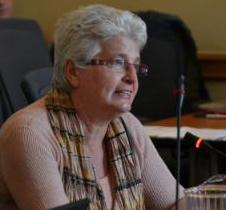
"Housing providers offering rental opportunities to the public need to do so in a non-discriminatory way," says Barbara Hall. Credit: Andrea Houston
A gay couple is filing a human rights complaint against a rental agent in Brampton after she denied them an apartment because the landlord does not want to rent the property to gay people.
After searching several weeks for an apartment, Thiago Derucio and his boyfriend, Chris Prentice, found a place using an agency called Rental Diva and called to book a time to look at the space.
When Prentice called, Juliet Stewart, the operator of Rental Diva, said the apartment was still available. When Stewart asked who would be renting it, Prentice replied that he’d be living there with his partner.
“She said, ‘You and your partner. What does that mean? Are you gay?’” Derucio says. “So he said yes.”
Stewart then told Prentice that the landlord explicitly said the apartment should not be rented to gay couples. She then ended the call.
Once the shock wore off, Derucio says, he called back. “I was pissed and hurt. So I called her back.
“When I asked if she is denying apartments to gay people, she said, ‘That’s right. My client doesn’t like gay people, and we have every right to decide who lives in the apartment and who doesn’t.’”
When Derucio reminded her there are protections in the Ontario Human Rights Code (OHRC) to ensure landlords can’t discriminate on the basis of sexual orientation, “She said, ‘Don’t go all gay rights on me. Get off my phone.’ Then she hung up the phone on me.”
Derucio says he and Prentice plan to file a complaint with the Ontario Human Rights Tribunal.
Stewart confirms that she discriminated against the couple, noting that she was only “protecting” Prentice and Derucio from a homophobic landlord. It was “too risky” for a gay couple to live in that apartment, she says.
“My clients are exempt [from the OHRC] because they are Seventh-day Adventists. They’re religious. That’s their religion,” Stewart says. “They told me that they don’t want [gay people]. Look, I’m a person of colour. I know what it’s like to be discriminated against. You can’t force someone to do something they don’t want to do. There’s jobs I didn’t get. I wish someone had of told me, ‘Don’t show up because you’re black.’ I wish they would do that because I wouldn’t waste my time. That’s a part of life.”
Stewart says it’s not her place to “push [homosexuality] down their throats” and she doesn’t want to risk losing the client.
“If I said anything, the client would get angry,” she says. “I don’t want to lose my contract with them for going against what they said they didn’t want.”
When informed that Prentice and Derucio plan to file a human rights complaint, Stewart replied, “So be it. If they want to go after me, go after me. I’m the messenger.”
Barbara Hall, chief commissioner of the OHRC, says a human rights complaint is very serious and could result in damages paid to the complainant.
“The code applies to all rental housing arrangements,” she says. “Housing providers offering rental opportunities to the public need to do so in a non-discriminatory way.”
Hall says the complaint could be directed at both the landlord and Rental Diva. “An agent can’t rely on the fact that they’ve been told to breach the code. That doesn’t let them off the hook. They’re liable, as is the landlord.”
Once a complaint is filed, the agent and the landlord would have to submit a defence. Some cases go through a long process, others are settled along the way, Hall says. “Often when people realize how clear the law is, and realize that they really don’t have a defence, they settle it.”
If it goes to a hearing at the tribunal and the agent and landlord are found to have discriminated, they could be ordered to pay damages or take a course on human rights.
“It’s humiliating and hurtful for people who are denied their rights under the code,” Hall says. “It’s hard enough to find housing that people can afford without having that thrown at them.”
The OHRC regularly hears complaints about landlords discriminating against gay, lesbian, bisexual and trans people. So many that in 2011, the OHRC published a housing policy to highlight that section of the code.
“Fifty years ago, one of the motivators for the code in the first place was because landlords put signs outside of apartments saying, ‘No Jews,’ ‘No blacks.’ You don’t see those anymore, but there is still discrimination,” Hall says.

 Why you can trust Xtra
Why you can trust Xtra


